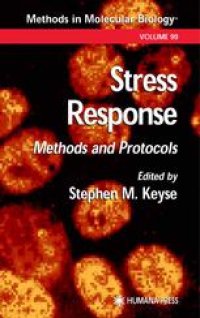
Ebook: Stress Response: Methods and Protocols
- Tags: Cell Biology
- Series: Methods in Molecular Biology™ 99
- Year: 2000
- Publisher: Humana Press
- Edition: 1
- Language: English
- pdf
In is now understood that the response of mammalian cells to a wide variety of potentially toxic agents may be intimately linked with many human diseases, including rheumatoid arthritis, ischemia, fever, infection, and cancer. In Stress Response: Methods and Protocols, Stephen Keyse has assembled a diverse collection of readily reproducible methods devoted to the study of these varied and powerful responses. Written by leading researchers expert in the techniques they describe, these detailed methods cover the detection and assay of stress-induced damage, the activation of a wide range of signal transduction pathways by cellular stress, stress-induced gene expression, and stress protein function. To ensure experimental success, step-by-step guidance is provided for each method, along with details of reagents, equipment, and other requirements. The methods include both well-established techniques and new technologies at the leading edge of research.
Wide ranging and highly practical, Stress Response: Methods and Protocols provides a gold-standard bench manual for today's basic and clinical scientists working to understand how cells and tissues respond during physiological stress and in human disease
In is now understood that the response of mammalian cells to a wide variety of potentially toxic agents may be intimately linked with many human diseases, including rheumatoid arthritis, ischemia, fever, infection, and cancer. In Stress Response: Methods and Protocols, Stephen Keyse has assembled a diverse collection of readily reproducible methods devoted to the study of these varied and powerful responses. Written by leading researchers expert in the techniques they describe, these detailed methods cover the detection and assay of stress-induced damage, the activation of a wide range of signal transduction pathways by cellular stress, stress-induced gene expression, and stress protein function. To ensure experimental success, step-by-step guidance is provided for each method, along with details of reagents, equipment, and other requirements. The methods include both well-established techniques and new technologies at the leading edge of research.
Wide ranging and highly practical, Stress Response: Methods and Protocols provides a gold-standard bench manual for today's basic and clinical scientists working to understand how cells and tissues respond during physiological stress and in human disease
In is now understood that the response of mammalian cells to a wide variety of potentially toxic agents may be intimately linked with many human diseases, including rheumatoid arthritis, ischemia, fever, infection, and cancer. In Stress Response: Methods and Protocols, Stephen Keyse has assembled a diverse collection of readily reproducible methods devoted to the study of these varied and powerful responses. Written by leading researchers expert in the techniques they describe, these detailed methods cover the detection and assay of stress-induced damage, the activation of a wide range of signal transduction pathways by cellular stress, stress-induced gene expression, and stress protein function. To ensure experimental success, step-by-step guidance is provided for each method, along with details of reagents, equipment, and other requirements. The methods include both well-established techniques and new technologies at the leading edge of research.
Wide ranging and highly practical, Stress Response: Methods and Protocols provides a gold-standard bench manual for today's basic and clinical scientists working to understand how cells and tissues respond during physiological stress and in human disease
Content:
Front Matter....Pages i-xvi
Front Matter....Pages 1-1
Front Matter....Pages 3-14
Front Matter....Pages 15-24
Front Matter....Pages 25-34
Front Matter....Pages 35-47
Back Matter....Pages 49-60
....Pages 61-61